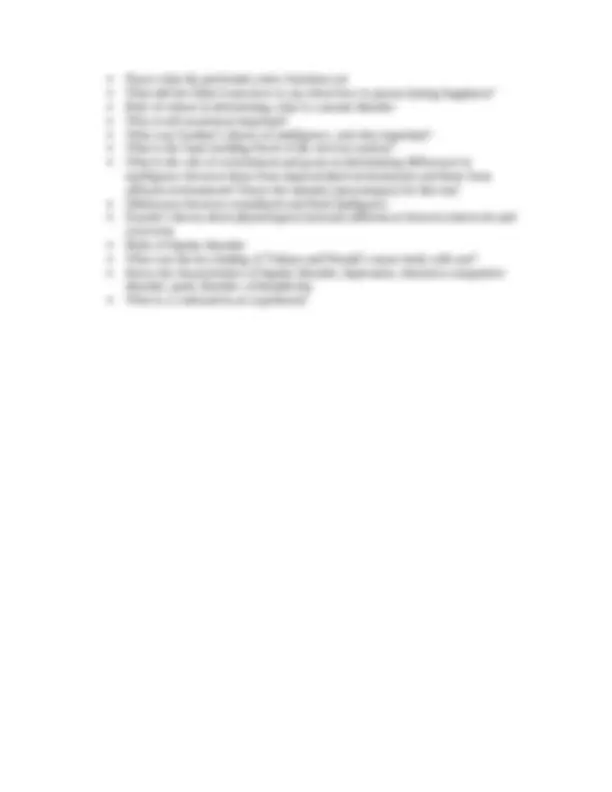



Study with the several resources on Docsity

Earn points by helping other students or get them with a premium plan


Prepare for your exams
Study with the several resources on Docsity

Earn points to download
Earn points by helping other students or get them with a premium plan
Community
Ask the community for help and clear up your study doubts
Discover the best universities in your country according to Docsity users
Free resources
Download our free guides on studying techniques, anxiety management strategies, and thesis advice from Docsity tutors
Final Study Guide Material Type: Notes; Professor: Caldwell; Class: General Psychology; Subject: Psychology; University: Ithaca College; Term: Fall 2010;
Typology: Study notes
1 / 2

This page cannot be seen from the preview
Don't miss anything!


General Psychology, Fall 2010 Final Exam Study Guide What is a dependent variable? Independent variable? What is the stress response system in the body? What is the key stress hormone released during stress? When it comes to heart disease and cancer, which factors are important? (stress, lifestyle, genes, personality traits) Does stress cause cancer? Role of amygdala/functions What is memory consolidation and when does it usually happen? Be able to interpret a correlation – what in means when it is negative or positive, and how to interpret the relative strength of a correlation! Know difference between declarative and nondeclarative memories; flashbulb memories, semantic and episodic memories How depressed individual have distorted thoughts How do neurons communicate – electronically or chemically? Know the key distinctions between clinical disorders and personality disorders Why do we use experimental design is research? Causality! The major assumptions about personality according to Freud What type of classical conditioning can happen after only one single learning trial? Who is the founder of American behaviorism? Difference between sensation and perception Difference between the sympathetic and parasympathetic nervous systems Difference between bottom-up and top-down processing What are drive theories of motivation and which behaviors do they best explain? What is the most common psychological disorder in the U.S.? What is Pavlov famous for in psychology? Research on shyness – is it a personality trait from birth or one that typically develops later in life? The research on men, women and suicide. Personality – is it considered to be stable or unstable? Who is responsible for Bobo doll study of aggression and what were the findings? What happens when you reward children for doing something that was already intrinsically motivating? Findings of the research on stress and mindfulness presented in class Findings on meditation and the changes in the brain presented in class In classical conditioning, what is the US, CS, UR, CR Difference between experimental and correlational research What “disorder” was in the DSM in 1973 but not today? - discussed in class. What is the diathesis-stress model? What is diathesis? What did behaviorists like Watson say was the only valid way to study psychological activity? What was the proper focus of study?
Know what the prefrontal cortex functions are What did the Dalai Lama have to say about how to pursue lasting happiness? Role of culture in determining what is a mental disorder Why is self-awareness important? What was Gardner’s theory of intelligence, and why important? What is the basic building block of the nervous system? What is the role of environment and genes in determining differences in intelligence between those from impoverished environments and those from affluent environments? Know the statistics (percentages) for this one! Differences between crystallized and fluid intelligence Eysenk’s theory about physiological (arousal) differences between introverts and extroverts Risks of bipolar disorder What was the key finding of Tolman and Honzik’s maze study with rats? Know the characteristics of bipolar disorder, depression, obsessive-compulsive disorder, panic disorder, schizophrenia What is a confound in an experiment?